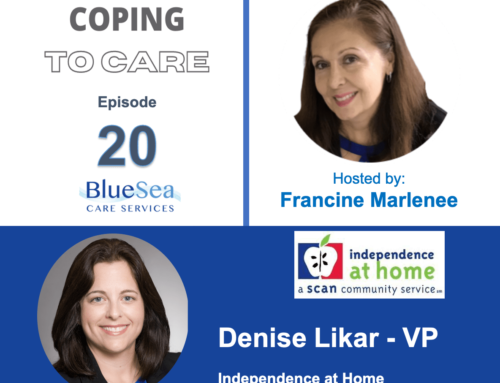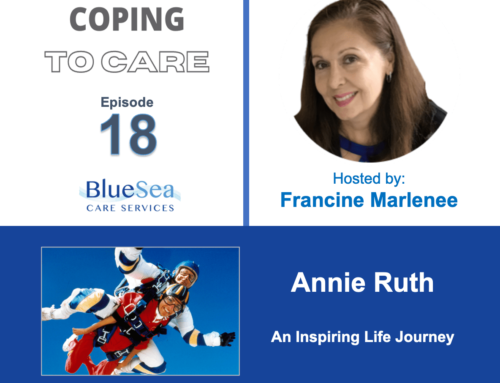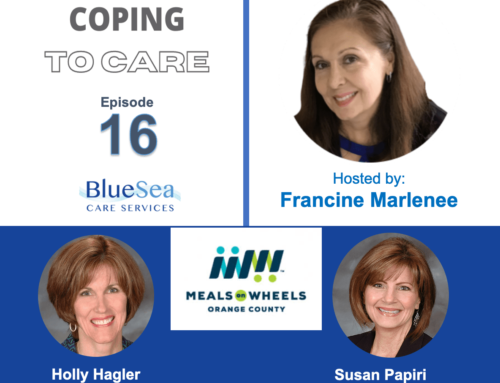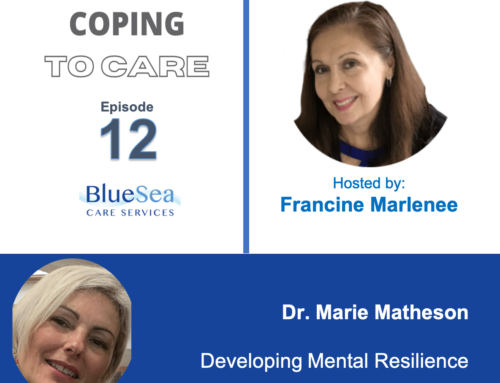In this week’s Coping to Care: Expert Tips for Complete Well-Being, we are diving into the importance of mental health and what you can do to care for your mind.
Just as important as your physical health, mental care is essential, especially with how you relate to your emotions, surrounding environment, senses of trauma, and changes within the environment.
Craig Springer, licensed psychotherapist and founder of The Good Life, offers deeper insights on what we can do to make sure our well-being includes our state of mind.
How Do Seniors and Their Families Cope With Covid?
The first point of interest we spoke with Dr. Springer about was how seniors and their families cope with COVID, especially in relation to mental health for seniors. He noted first that we have to recognize how much COVID has changed our lives from the way we usually do things to what we require now. This not only includes going out to restaurants, but also working at home, and seniors have caused limitations to go out or with restrictions at nursing centers.
The tip that Dr. Springer starts with is the need to look at a “new normal.” These are coping mechanisms that can be used with working from home, creating new schedules, and making sure we maintain a state of mind that is healthy, despite the surrounding environmental changes.
For seniors, this means creating a new normal with staying active, exercising, finding enjoyable activities, and things that one can do right now. While he acknowledges this may have limitations, as well as some unavailability, it’s important to find new pass times.
Dr. Springer goes in-depth about the importance of socializing, especially during times of social distancing. If it can’t be done in person, working with online mediums is just as important to not isolate.
Deciding not to isolate is not only based on the need to connect with others. It’s also related to sharing wishes and wants, as well as concerns that one may have. Distancing doesn’t mean shutting down socially, specifically with the need to create more social relationships that are open and connected, even if it’s virtual.
Dr. Springer also acknowledged that a healthy mind also relies on looking at how we will move past this and that it is a temporary condition that will lead to significant changes with our perspective and mindset.
A specific highlight from Dr. Springer was to focus on gratitude and to keep a journal that brings them to a mentally stronger place.
Defining Post-Traumatic Growth
An important highlight and theme from Dr. Springer were to look at post-traumatic growth. He highlighted that often, we look at the negatives of the current circumstances.
However, whenever there is a trauma, it is also possible to reach a state of growth afterward. These are positives that come out of a traumatic circumstance and allow us to grow.
Resiliency, creativity, and changes that we have had to make can benefit our lives for a longer-term.
Looking for things that we can take out that are positive and that are allowing us to help or be grateful is more important at this time. Not getting into a negative time frame can assist with changing the pace of your mental state.
Where Do You Go For Reliable Information?
Dr. Springer mentioned that looking on the bright side and remaining resilient was only one side of the coin. Accuracy in information and getting the correct insights were as vital.
The American Psychological Association, the American Psychiatric Association were both mentioned. He also stated that places like the CDC provided information about mental health that could provide better information, all which contribute to more mental health for seniors.
Changing the Field of Psychology and Mental Health
As more individuals now recognize that mental health is important, there is a change in how we begin to interact with self-care.
Mental health is now going online more, while physical and mental health is being taken more seriously.
More important, education in a combination with more services is becoming a growing trend, specifically because of the changes such as increased depression and suicide. This relates to economics, joblessness, and even being at home more than usual, often which leads to more conflict. Dr. Springer noted that it was important to recognize that child abuse, domestic violence and outbreaks were increasing, while many felt more isolated and unable to get the help they needed.
As a result of the changes, mental health is now into full awareness and bringing a different twist to what the most important parts of healthcare are.
Not only was their acknowledgement of the changes with mental health by staying at home, but also with first responders, specifically with those who have not seen health issues that they are now.
Impacts of Mental Health on Family Ties
What many aren’t seeing is how mental health is impacting families and those who are dealing with COVID.
A large change that has taken place is in relation to first responders who are now the last to see someone when they die. Families who are unable to see their loved ones with the virus are having to learn to cope differently from the trauma.
The result is that many are having to experience the trauma of loss differently in terms of how to cope and how to heal from the situation that is occurring.
Dr. Springer noted that the most important part is to look at the socialization for children and looking at how this is impacting families and noting that the broad, vast level of the virus will have a far-reaching impact. Looking at impact and recognizing where you are is an essential part of mental health for seniors.
The result is a force of change, both positive and negative, as well as recognition as to how this is making us re-look mental health to socialization.
Positive Opportunities for Seniors
With the changes that are occurring, seniors have a special space to staying positive, informed, and social.
Dr. Springer’s approach is to look at your mental awareness and how much you need to look at. His approach is to focus on what you enjoy and that you can contribute positively to in relation to mental health for seniors.
Socializing online or by phone, attending online classes for seniors, playing games that are enjoyable, staying active with exercise, eating healthy, and maintaining a routine are all more important now than before.
Scheduling is now more important than before, specifically because of the idle time as well as the limitations of going out.
More important than this, is not feeling helpless. Contributing positively to the community, volunteering time, coordinating things like meals, can all assist with bringing a better mental state.
Contributing, giving back, and feeling like you have your purpose right now is the key element to staying mentally healthy right now.
What To Do If You’re a First Responder
Dr. Springer spoke of the first responders and the importance of mental health for caregivers.
He pointed out that, while things are in a crisis stage, it may not be possible to get support. However, there may be a longer traumatic impact on those who are on the front lines. When things do slow down, he knows that it’s essential they take time for self-care and to go through a healing process that assists with moving beyond the intensity of these times.
Dr. Springer also advised to look at the company’s and the educational institutions that are extending their reach. Free classes, complimentary services from companies and reaching out to others from those who are concerned are all something that caregivers and workers should look into.
Exploring Mindfulness
A practice that Dr. Springer emphasizes is mindfulness practices, something he uses in his own sessions.
The approach is to look at anxiety and depression, both of which come from uncertainty and not knowing what the future is going to be.
As a result, we let our fears and the worst that can happen run the show.
Depression is instead focused on what we don’t have control over when it comes to our past and how it has impacted us with the present.
With no control of the future or past, it leads to swings of anxiety and depression or emphasis on the changes we must accept or move into.
Dr. Springer’s focus on mindfulness is the ability to control the present. The here and now in mind and body is the most important aspect of this.
The meditation, breathing, and focus that Dr. Springer offers are based on observations of where you are right now. This can be through eating, activities, experiences through all five senses, and staying in peace and silence. These are important practices to include for mental health for seniors.
This highlights where our focus should be and what we have control over right now.
Mindfulness focuses on the need to train the mind and learn how to be present now instead of going into the past or future circumstances that cannot be controlled.
To learn more about Craig Springer, visit his website.






